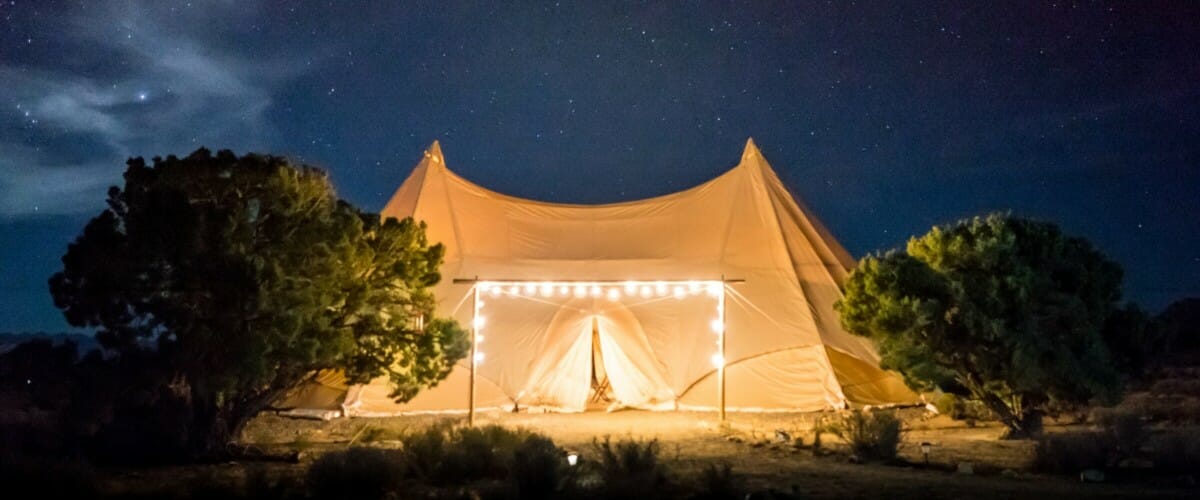On the Field and in the Stands
Band and orchestra players are not fond of playing outside. It is usually too hot or too cold and it is always too windy. Temperature and humidity affect the instruments, making tuning them even more of a challenge than it usually is. To counter the effects of the wind players either put all the music in plastic sheet covers in 3-ring binders, or they go high-tech and use clothespins to keep the music on the lyres.
I can imagine that playing in a tent is even more dangerous—tents are temporary structures. A strong wind can easily blow one down! We are living in a day when the wandering winds of methodology are blowing down worship ministry “tents” all over the country.
King David had a Tent?
He really did! We find out about the Tent of David in Acts 15 in the account of the first great church conference. The issue was a crucial one: What should Jewish believers do about all the Gentiles who were giving their hearts to Jesus? James settled the matter by quoting the Prophet Amos that the Lord would someday rebuild the tabernacle (tent) of David which had fallen down so that the Gentiles could seek the Lord and find Him. The Church of Jesus Christ would not be an ethnic entity but would be open to all races.
What Was It?
Authorities disagree on the meaning of the image of the tent, or tabernacle, of David.
- Many say this is simply a reference to the house of David through which Messiah would come.
- Others say that this term refers to the eventual restoration of Israel. The issue at hand was not about some time in the future. It was about the New Covenant that was blossoming at that moment all around the followers of Jesus.
- The immediate application of the Tent of David was vital to the mission of the disciples—the Great Commission. Today’s application for worship leaders is crucial to our twin tasks of developing the church as a worshiping community and telling the world about Jesus.
- Through the historical accounts of David’s Tabernacle and in the teaching of the Psalms we find a biblical case for instrumental and vocal worship and community-based ministry through the arts.
A Quick History Lesson
One of the first things King David did was send for the Ark of the Covenant. When the Ark arrived safely in Jerusalem, he placed it in a tent on Mount Zion.
- He appointed large groups of singers, instrumentalists, teachers, and leaders to make music day and night before the tent containing the Ark.
- He invented instruments for them to play and wrote music for them.
- The whole idea of public worship was born before that tent.
In stark contrast to the highly individualized worship at Moses’ Tabernacle, community worship arts took root at David’s Tabernacle. Worship leaders appointed by the King had a sourcebook and an instruction manual—the Book of Psalms.
The Old Tent and the New Covenant
In the next generation, when King Solomon built the Temple, the singers and players were ready—they had been ministering together for 40 years at David’s Tabernacle! When they made music, the Glory of the Lord filled the House of God! The Temple in Jerusalem became the geographic center of Old Covenant worship until the time of Jesus.
Jesus, however, brought a New Covenant! When He paid the full price for the atonement of our sins, the veil in the Temple was torn from top to bottom. Here’s the way I describe it in Worship that Pleases God:
…the presence of the Lord could no longer be contained in that little room. The manifest presence of the Lord burst forth from the old order to search out the willing hearts of a new order and come to rest there. It was as if the old covenant of His promise exploded into a new covenant of His presence and the veil suffered the force of the blast.
In the New Covenant, the temple in Jerusalem has been replaced by a spiritual one—the hearts of those who worship Jesus. We are now the habitation of God by His Spirit. (Eph 2:20-22)
New Covenant worship is more like the Tent of David than the Temple of Solomon!
- It is portable so we can take it anywhere we go.
- It is alive with community creativity.
- It is open to whosoever will.
So, how does such a wonderful tent get knocked down? The wandering winds of the fallen culture weaken its structure, loosen its stakes, and finally pull it down.
Detecting the Wandering Winds
In Ephesians 4, the Apostle explains that leaders are given to the church for the purpose of preparing God’s people for works of service. It is incumbent upon leaders that we are not “tossed about by every wind of teaching.” The winds of pop culture are the prevailing winds in many houses of worship today. While it is important to speak, sing, and play in the textual and musical languages of this century, worship must also speak eternal truth to the fallen culture.
I have observed a downsizing movement. Large churches where the worship of the people was once led by a host of singers and a well-chosen, well-prepared instrumental ensemble are now being led in worship by a mere 5 or 6 people. Has the Tent of David fallen down?
The Bible calls for singers and instrumentalists and for skillful leaders. The New Testament tells us to use the Psalms as our book of prayer and source of worship wisdom. Why? Because the Ruach, the “breath of God,” can be found in the Psalms and this is the wind we must have.
In speaking to leaders who are downsizing their worship ministries, I receive many cultural reasons for these methods:
- Choirs and orchestras are no longer culturally relevant.
- Choirs and orchestras are large and inflexible.
- We want intimate expressions of worship.
- Choirs and orchestras are old fashion and traditional, etc.
My observation of 21st-century culture leads me to different conclusions:
- Culturally relevant? Every locality that has art music and music education in the schools also has thriving artistic communities where choirs, concert bands, orchestras, and live theatre groups are very much a part of the lives of people.
- Inflexible? The choir and orchestra can be as flexible as any praise team /band if the leader knows how to lead them that way.
- Intimate? With skillful orchestration, intimate worship music can be wonderfully expressed by the instruments of the orchestra. Besides, intimacy with God is only half of the spectrum of worship. Grandeur and majesty are just as important as intimacy. The people of God must honor God as Creator as well as God with Us.
- Traditional? Theologians call the generational transfer of faith “traditioning.” It is true that Choir and orchestra ministry is traditional but this “traditioning” is vital! We must pass the truth of God to the next generation of worshipers and that is the irreplaceable role of tradition!” Contemporary choirs and orchestras can well express both traditional and modern worship music. This requires the ministry of the pastoral artist.
I am often told that choir and orchestra-led worship is just my personal choice and has no more validity than the choices of other worship leaders. While this ensemble is certainly my personal choice, I believe the neglect of this form of ministry is a serious breach of biblical ideals, not my preferences.
What lifts the choir and orchestra above the level of personal preference into the rarified air of a biblical mandate?
I believe that the Psalms and the biblical histories of the worship of the people at David’s Tabernacle are both descriptive and prescriptive, making them real and relevant today.
Consider the following evidence:
The Scriptural Mandate for Community Arts in Worship
Descriptive Examples/ New Testament Endorsement of Psalms
- King David appointed large groups of people to sing and play before the Ark in the Tabernacle of David. 1 Chron 15:16; 23:5; 1; 25:1; 6-8
- Teachers (fathers) and students (sons) ministered side my side in the worship services. 1 Chron 25:1; 6-8NIV
- Leaders were appointed because they were skillful at singing and playing music. 1 Chron 15:22
- Worship singers and instrumentalists played for spiritual reasons. 1 Chron 16:4-6 NKJV
- The Lord was pleased with united praise from the congregation, the choir and the orchestra. 2 Chron 5:12-14
- The New Testament links the Psalms with maintaining the infilling of the Holy Spirit. Eph 5:17-20
- The New Testament endorses the instructions found in the Psalms as profitable for doctrine. 2 Tim 3: 16-17
Prescriptive Mandates from the Scriptures
- The worship of the People of God must be musical. Ps 30:4
- Community worship must be vocal and instrumental and from the heart! Ps 57:7
- Community worship must be trans-generational. Ps 145:4; Ps 79:13
- Leaders should sing and play new songs for the congregation. Ps 149:1
- Community worship should fully engage the creativity of the congregation Ps 150
- Community worship should present processionals before the Lord with music, dancing, and banners. Ps 68:24-25; Ps 20:5
- Original works of praise and worship should flow from the congregation. Ps 45:1
- Along with pure hearts, joyful artistic skill is routine. Ps 33:1-3
Five Blessings of the Tent of David
I have been preparing, playing in, and writing for volunteer church choirs and orchestras since the early 1970s. This extended experience has demonstrated remarkable consistency over these decades.
- Choirs and orchestras represent the people of the church to the congregation. They are not professionals or outsiders. The congregation contains their friends and family who know the authenticity of their offerings of worship.
- Young people who participate in choirs and orchestra generally grow up to be men and women who serve God all their lives. Music ministry is not primarily a performance medium—it is a discipleship program. If we are not training the next generation of singers and players, who will?
- Choirs and orchestras are meeting places for the generations within the church. In the last quarter of a century church leadership has divided the family into age-specific ministries. I see the choir and orchestra, especially the orchestra, as the rare ministry where adults and teens minister together.
- Choir and orchestra-led worship promote unity. Because the singers and players come from the congregation and represent several age groups, this vocal/instrumental ensemble counters age segregation in the church today. A good orchestration can moderate a contemporary song so that older worshipers can receive it and even sing it. At the same time, a well-done orchestration can punch up a traditional song and make it possible for younger worshipers to receive it and even sing it.
- Choir and orchestra-led worship recognize the call of God on the people of the church. If there are people in the church whose calling is to sing and/or play, it is the responsibility of their leaders to “prepare them for works of service.” With the demands of the Great Commission and the Great Commandment, the church must not ignore those who are called and gifted to communicate.
Is the Worship Ministry Rich or Poor?
When we look at the worship leadership on the church platform and see a host of singers and a band of brothers and sisters playing instruments, surely we realize that an even larger host is represented—the disciples of the next generation waiting in the wings. This is a church rich in the chief assets of worship—people!
When we see a huge church platform, mostly hidden by darkness, with 5 or 6 artists in spotlights, do we see the artistic and spiritual poverty this represents? The wandering winds have done their work.
It is time for the return of the “rushing, mighty wind,” –the Ruach—the breath of God!
- The fresh winds of the Spirit of God will inspire the creativity of the People of God.
- God wants a structure wherein elder artists can mentor younger ones, as the generations of the church speak with each other.
- He wants the people of God to express His grandeur with anthems of high sounding praise and He wants to breathe on them tenderly just as Jesus did His disciples saying, “Receive ye, the Holy Spirit.”
It is time to seek out all of God’s talented, anointed ones and organize them into intergenerational artistic communities dedicated to worship, witness, and win the next generation. It is time to undo the work of the wandering winds of a fallen culture. It is time to rebuild the Tabernacle of David.
When we do, on the field, in the stands, and in the face of contrary winds. we can make the music the world needs.
This is an updated edition of a post originally published on Steve Phifer
Featured Image by Cindy Chen on Unsplash




















Comments are closed.